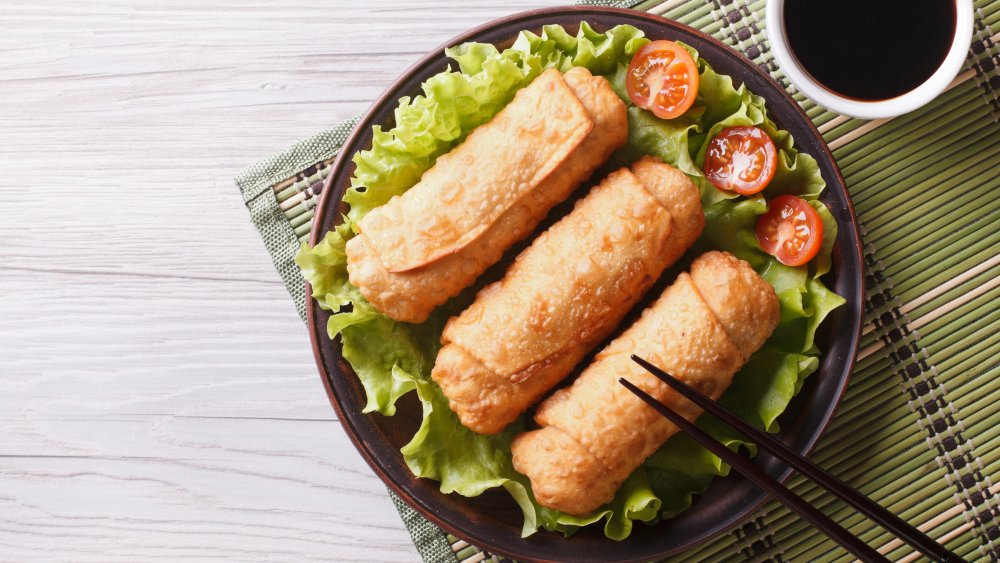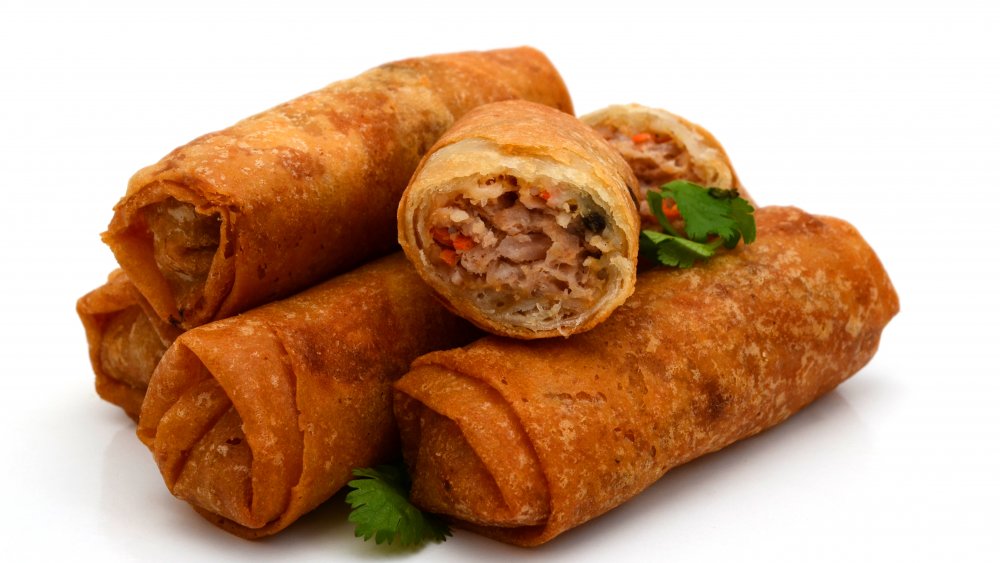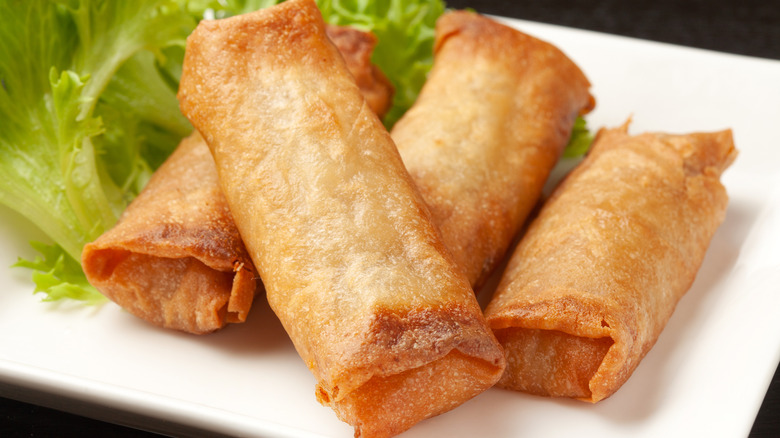You Should Never Order Egg Rolls At A Chinese Restaurant. Here's Why
Part of the allure of ordering from a Chinese restaurant is all the little extras you can add on, like fried wontons, pork dumplings, and everyone's favorite: egg rolls. Often, when you place your order and these terms roll off your tongue, you're not mentally calculating the fat and calories that come along with them. You're hungry! And someone with real skills in the kitchen is going to bring you delicious food for you to enjoy. Well, if you want to avoid shock and surprise on the bathroom scale tomorrow morning, you may want to think twice about ordering egg rolls tonight.
According to Eat This Much, one egg roll carries 222 calories, 10.6 grams of fat, 14.2 milligrams of cholesterol, 24 grams of carbs, and 416 milligrams of sodium. Ahem ... that's 18 percent of your daily recommended amount of sodium in just one egg roll. You haven't even made it to the sweet and sour chicken yet! The next time you're tempted to order egg rolls at a Chinese restaurant, here are some more things that might change your mind.
Don't be fooled by all the veggies stuffed into egg rolls
Egg rolls can be deceiving, in that they are basically stuffed with salad and a little bit of protein. An "authentic" recipe for Chinese egg rolls from All Recipes starts out with eggs, shredded cabbage, carrots, bamboo shoots, mushrooms, roasted pork, and green onions. These are all things you could document in your food journal with zero guilt and caption it, "Living my best life!"
Not so fast, though. Yummy food requires seasoning which, in this case, includes soy sauce, salt, sugar, and MSG. Okay, we see you, sodium! While these seasonings will undoubtedly make all those plain veggies taste delicious, sodium can have some nasty effects on your body. The Healthy says consuming too much sodium has been linked to brain fog, excessive thirst, and bloating. Even more serious side effects include kidney stones, stomach ulcers, and high blood pressure. The FDA recommends limiting sodium intake to less than 2,300 milligrams per day. One or (let's be honest) two egg rolls can really cut into that number if you're enjoying them in addition to a main course.
Egg rolls contain trace amounts of trans fats
If you can get over the sodium content in your egg rolls, the next hurdle is right around the corner, in a pot of bubbling hot oil. In general, we know fried food is not great for us. But maybe we forget that deep-frying foods like egg rolls opens the door for trans fats. Eat This Much notes trace amounts of trans fats in egg rolls, which are likely a result of the deep-fried cooking method.
Healthline says when oil is heated to high temperatures, hydrogenation occurs. Hydrogenation transforms unsaturated fats into trans fats, which are linked to the risk of heart disease, diabetes, cancer, and obesity. The Mayo Clinic recommends keeping your trans fats as low as possible, which may mean saying goodbye to egg rolls for good. If you have the strength to stick to egg rolls as a once-in-a-while treat, more power to you. For the rest of us, perhaps we'll skip the appetizers and save our calories for the chow fun.
Egg rolls may contain hidden allergens
If you are allergic to soy, nuts, eggs, or seafood, egg rolls can be problematic because of the unexpected ways these ingredients can show up in them. As PeanutAllergy.com points out, peanut butter can be used to keep egg roll ingredients intact, and the other ingredients will camouflage the flavor. Cooking oil is regularly reused (via Reader's Digest), so potential allergens from one dish could contaminate another. Then there is the possibility that one ingredient can show up unannounced in an egg roll whose filling may be too densely packed for a diner to notice before it is too late. Allergy coach Sloane Miller told ABC she once "ordered a vegetarian dish and it showed up with a claw."
To head off any potential problems, large Chinese restaurant chains like Panda Express have taken to adding a disclaimer to their egg rolls online, stating that all its ingredients contain all the FDA's major declared allergens. It's a warning that we would be wise to apply across all restaurant egg rolls.
Hidden allergens might not be the only contaminants to worry about. In 2018, AZ Central reported that health inspectors discovered a Phoenix-based Oriental Express was storing egg rolls in a cooler with a "mold-like substance" and placing cooked egg rolls on bags of raw beef. And according to the food safety law firm Marler Clark, in 2009, 6 tons of egg rolls that were being sold to restaurants across California had to be recalled because they may have contained Salmonella-tainted pepper.



